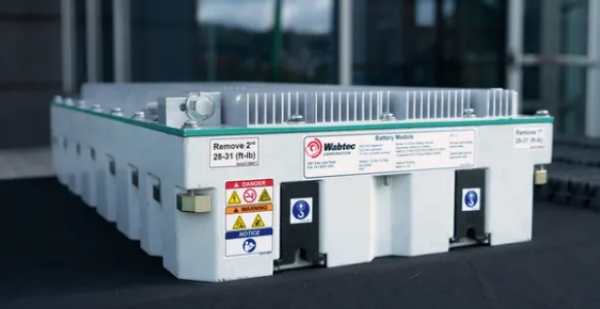An idea whose time may be close: battery-powered TRAINS
Even better than electric cars, I’d say.
Ars Technica analyzes whether we could already use big batteries to power trains. Here is why you should read the whole analysis.

<u><em><strong>CAPTION:</strong>
<a href="https://www.theguardian.com/us-news/2021/sep/16/battery-electric-freight-train-wabtec-rail-transport-emissions" target="_blank">A battery cell for trains, click for more (from The Guardian)</a>
</em></u>
The problem: diesel trains are toxic
Right now, moving freight with diesel-powered locomotives is estimated to pollute enough to cause 1,000 premature deaths and $6.5 billion in health damages every year, in the USA alone.
Electrifying the whole system with wires above the tracks would cost too much. Hydrogen fuel cells would be cheaper, but making enough of them is " likely many years away from becoming a reality".
This leaves batteries. Many existing locomotives move their wheels with electric generators. Attaching those same generators to big batteries, instead of the diesel engines that currently power them, would finally make the trains as green as those batteries.
Until a few years ago, this solution was really too expensive. Now, it’s almost profitable, at least in some scenarios. For details, see the links. The conclusion, however, is that…
“The system is not there yet”
Not profitably, that least, as it also depends on building the battery management infrastructures, and use it enough to pay for it quickly enough. Charging would also cost more when it cannot happen when wind or solar generators are not producing more power than needed by other users. But we are getting closer and closer. Besides…
Making things really interesting: MOBILE batteries
“The analysis becomes very interesting when the researchers leave freight behind and start thinking about what could be done with many big, mobile batteries. Even without moving them, freight companies could use their capacity to provide grid stabilization services or sell back power when the price gets high. In extreme cases, this system could actually pay for the entire infrastructure."
My own little executive summary: you cannot solve any systemic problem, be it freight transportation or anything else, without remaking the whole picture around it. Interesting times await us. Especially if freight volume will sensibly decrease in the next decades, thus making all the currrent cost/profit forecasts moot.
Who writes this, why, and how to help
I am Marco Fioretti, tech writer and aspiring polymath doing human-digital research and popularization.
I do it because YOUR civil rights and the quality of YOUR life depend every year more on how software is used AROUND you.
To this end, I have already shared more than a million words on this blog, without any paywall or user tracking, and am sharing the next million through a newsletter, also without any paywall.
The more direct support I get, the more I can continue to inform for free parents, teachers, decision makers, and everybody else who should know more stuff like this. You can support me with paid subscriptions to my newsletter, donations via PayPal (mfioretti@nexaima.net) or LiberaPay, or in any of the other ways listed here.THANKS for your support!